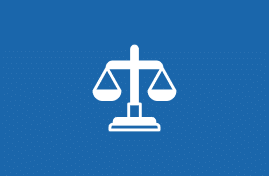Human Rights Law Firms support people who have been victims of torture, human trafficking, discrimination, sexual violence or other human rights violations. They do not shy away from challenging the powerful and taking legal action to hold perpetrators accountable. Below is a directory of human rights law firms working on a variety of issues. If you are a human rights law firm and would like to add your firm to this list, get in touch.

IHR LEGAL
Leading law firm specializing in international human rights law counseling and litigation based in Washington, D.C. and Geneva.

Doughty Street Chambers
They provide legal services in criminal, civil and public law, including all aspects of human rights law and civil liberties.

Hausfeld LLP
Pioneering the field of human rights litigation, standing up to authoritarian regimes and powerful corporations on behalf of victims.
Law turns the idea of universal human rights into practice. Using the law, lawyers and firms enforce the concept of human rights and turn it into reality. Law provides a path for justice for those whose rights have been violated. Lawyers from human rights firms are dedicated to holding violators accountable, providing legal counsel to victims, and ensuring protection through the process, such as the right to a fair trial.
What are human rights law firms?
Within many law firms – both small and large – there are lawyers specializing in human rights. They often provide pro bono services to NGOs, human rights organizations, and individuals. Why pro bono? Providing services for free benefits firms because it gives lawyers good experience, helps the firm comply with legal ethics requirements, and draws attention to the firm’s commitment to justice.
Pro bono work also amplifies major human rights issues. As an example, the law firm Cohen Milstein represented (pro bono) Holocaust survivors suing Swiss banks that collaborated with the Nazis. The lawsuit ended in a $1.25 billion settlement and forced historians to reconsider Switzerland’s place in WWII. Human rights law firms not only seek justice for specific cases but play a significant role in strengthening human rights as a whole.
What do human rights law firms do?
The work that human rights law firms conduct varies. Lawyers support survivors and victims of torture, human trafficking, sexual violence, discrimination, and more. Areas of practice can include sexual abuse and harassment, class action suits, personal injury, and consumer rights. To defend human rights, firms will take on advocacy, fact-finding and research, impact litigation, and representation. Lawyers may also work within organizations, including government organizations, to craft human rights laws, policies, and programs.
Many firms take on an educational role and help train human rights lawyers and conduct academic research. Through writing and lectures, lawyers at human rights law firms share their knowledge of laws, legal systems, and more. This education empowers people and helps them recognize when their rights are violated.
Risks of working in human rights law
Working at a human rights law firm is not without risks. Lawyers often take on powerful, well-funded opponents that would prefer their violations of human rights remain hidden. These opponents and their allies may threaten lawyers and their clients. Retaliation is not uncommon. New laws may criminalize the work of human rights law firms and lawyers, while threats of violence intimidate those seeking justice. By discriminating or hindering a lawyer’s ability to do their job, the legal system itself may also be a challenge to human rights firms. Failing to win cases hurts the reputation of human rights law firms, which means fewer people come forward for representation.
Preparing to work at a human rights law firm
Becoming a human rights lawyer is a long process. You first must get a bachelor’s degree followed by a Juris Doctor. During undergrad, you can develop skills you’ll need to practice such as critical thinking, research, and public speaking. If you want to work in international human rights law, knowing other languages (especially the official UN languages) is also necessary. A Juris Doctor (J.D.) is completed within three years at a law school program. In addition to the academic requirements, taking part in MOOT courts, legal clinics, and paid internships are important. You must then pass the BAR exam or any other qualifying exams needed to practice law.
Choosing a human rights law firm
Many law firms have human rights as an area of practice, but what makes a firm a good fit for a human rights lawyer? There are some things to keep in mind, such as the fact that while 62% of lawyers move firms within four years of practice, the first firm they work at sets the tone for their career. Choose a law firm that represents your values. Consider how well-known they are, as a firm with a respected name will increase your future opportunities. You should also consider the working environment and where the firm is located. Is it a location where you would like to live? Lastly, consider the issues they focus on and how it aligns with your academic background and experiences. Once you pick a practice area, it can be challenging to switch, so the area you work in at your first law firm will likely be one you focus on for the rest of your career.

